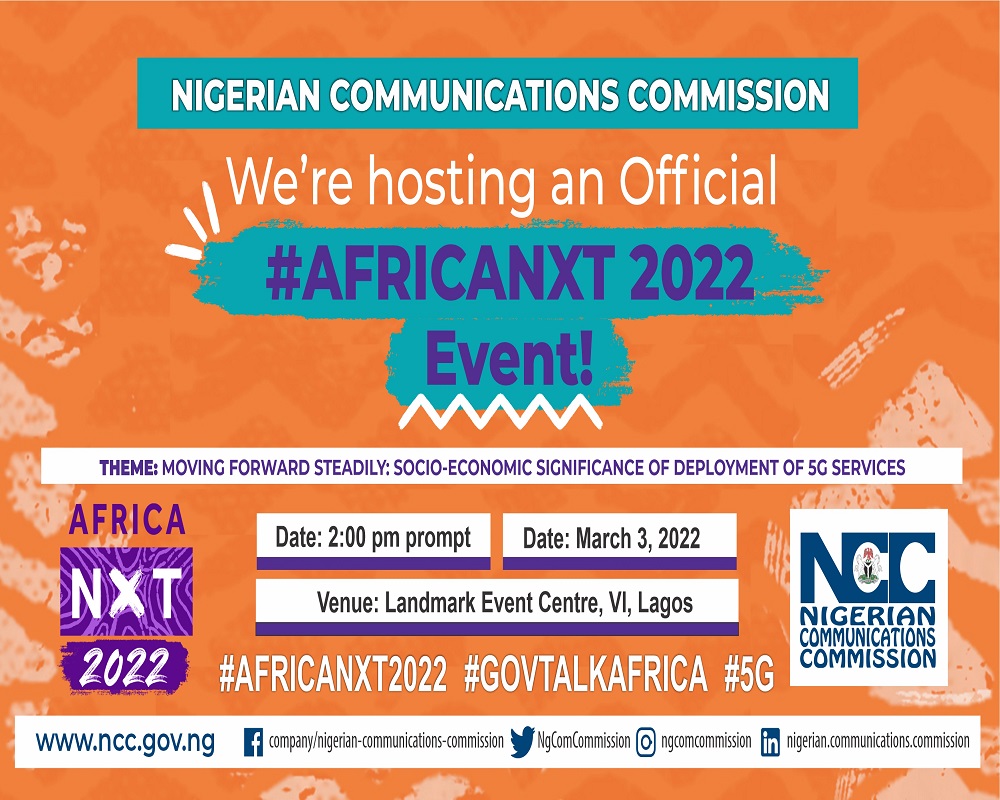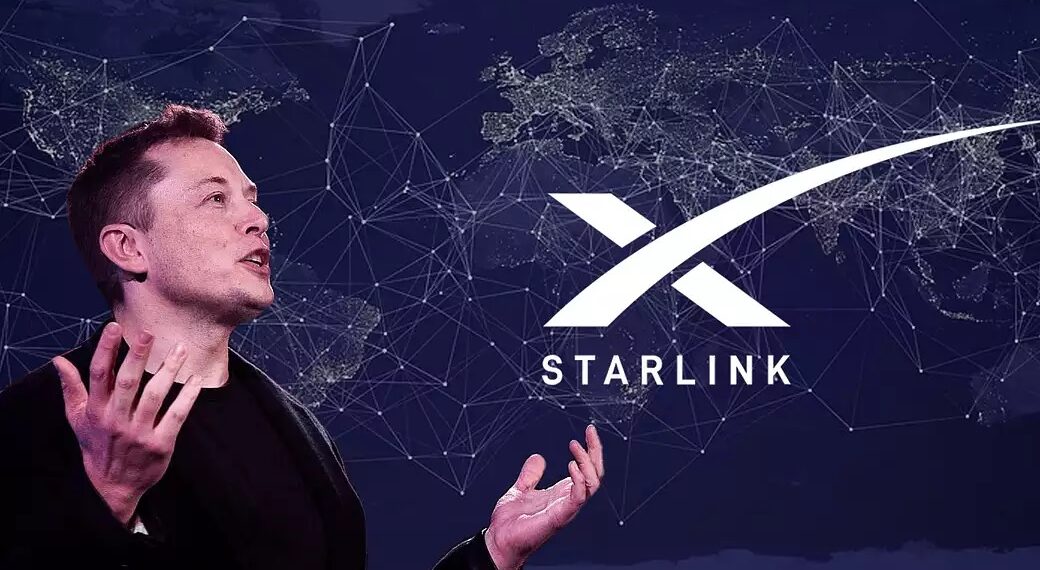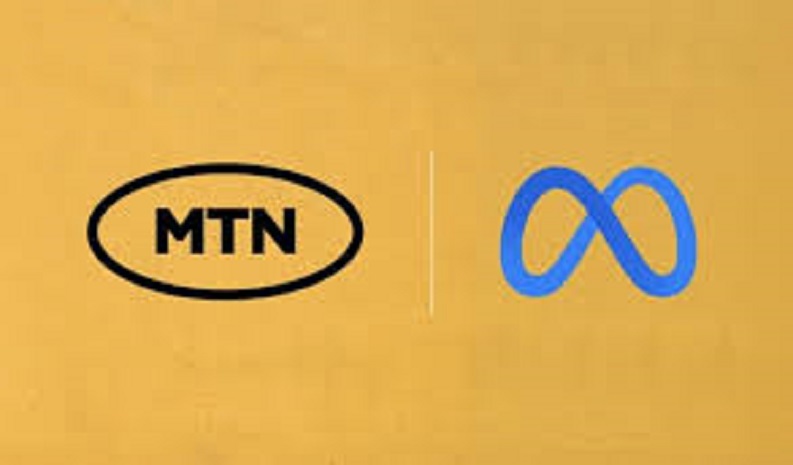Telecom
AfricaNXT Confab Objective Aligns with NCC’s Vision of Technology-Driven Prosperity for the Continent

The Nigerian Communications Commission (NCC) has reiterated its faith in the vision of the AfricaNEXT Conference (AfricaNXT) to “co-create a prosperous future for all Africans” through collaborations, conversations and programming that are oriented in harvesting, harnessing and leveraging innovative technologies.

“The visualisations and concrete actions of the AfricaNXT conference are in congruence with NCC’s faith in the promise of technology to galvanise Nigeria’s, nay Africa’s, development. This explains our continued support and participation at the Conference which is now in its 10th Year, and we will continue to play active roles in this event which takes place in Lagos annually”.
Prof. Umar Danbatta, executive vice chairman and Chief Executive Officer (EVC/CEO) of NCC, stated this with unmistakable conviction during a chat with the Commission’s in-house media team last week, ahead of preparations by the Commission’s delegation to the Confab which will take place from 27th February to 4th March 2022.
The EVC regretted his inability to lead NCC’s delegation to the Conference because he is already slated to play a key governmental and institutional role at the Mobile World Congress (MWC) 2022, organised by GSM Association.
The Mobile World Congress, the world’s largest and most influential forum and exhibition by stakeholders in the mobile technology ecosystem, takes place in Barcelona annually in the same week AfricaNXT happens in Lagos.
Formerly known as Social Media Week Lagos, the AfricaNXT Conference is the largest assemblage of innovators from across Africa and Africa’s Diasporan communities. As a consistent programming partner of AfricaNXT, the NCC has been a regular feature of the conference and festival.
Although the COVID-19 pandemic compelled the organisers to observe a low-key, strictly virtual conference in 2021, the 2020 conference was attended by over 20,000 people (both in-person and virtually).
At the 2020 conference, NCC’s discourse overviewed the Fifth Generation technology and services, where the panelists explained 5G, which at that time, seemed like an abstract idea to many.
At the AfricaNXT 2022, the NCC will take the discourse on 5G further in a more pragmatic context in view of the progress achieved over the past two years.
The thematic focus for its panel of discussants is, “Moving Forward Steadily, Timely and with Precision: The Socio-Economic Significance of Deployment of 5G Services”.
Participants will have the opportunity to glean the benefits of 5G services to individuals, businesses, and the nation, with positive implications for the Continent as Nigeria matches steadily to become the first country in West Africa to deploy 5G technology services.
The journey to the birth of 5G services in Nigeria started in 2019. Between then and now, the Nigerian Communications Commission has been upbeat in rallying stakeholders to forge all necessary partnerships, collaborations and alliances. There have been numerous stakeholders’ consultations (including an all-inclusive, robust public hearing at the National Assembly; and a presentation to the Federal Executive Council).
The NCC also instituted a communications campaign, pivoted on public information and education, especially in the vortex of misconceptions, misinformation, disinformation and malinformation about 5G.
Following the approval by the Federal Government, a Proof of Concept trials demonstrating the possibilities of 5G took place in some cities in Nigeria.
The NCC, in collaboration with stakeholders, equally developed an Information Memorandum, which was reviewed by all stakeholders, following which a policy on 5G was instituted by the Federal Government. The policy was unveiled to the public by President Muhammadu Buhari on 25 January 2022.
Armed with an extant approval, the NCC also, had earlier conducted a globally-acclaimed auction of the 3.5GHz spectrum on 13 December 2021. The spectrum is to be used to deploy 5G services. The bid was won by two communications companies and licensees of the NCC – Mafab Communications and MTN Nigeria.
Just few days ago, Prof. Isa Ali Ibrahim Pantami, Minister of Communications and Digital Economy, officially handed to NCC the spectrum for 5G services for allocation to the winners of the bid.
At the handover ceremony, which took place at Transcorp Hilton Hotel, Abuja, on 17th February 2022, Prof. Danbatta puts the status of implementation of 5G services metaphorically and figuratively by stating that “the coast is now clear” for the launch of 5G services in Nigeria.
Therefore, having fulfilled every condition precedent to the deployment of 5G services in Nigeria, the NCC, tried-and-true, and in demonstration of commitment to its noted operational efficiency and regulatory effectiveness, is not resting on its oars in public education and information sharing.
It is the reason the Commission is leveraging AfricaNXT, a rare, seminal, and historic assemblage of practical innovators and enthusiasts of technology and development, to deepen knowledge about 5G among its ever-widening geography of stakeholders.
The NCC discourse at the AfricaNXT 2022 will take place at the FutureNow Stage, Innovation Pavilion, Landmark Event Centre, Water Corporation Drive, Off Ligali Ayorinde Street, Victoria Island, Lagos. The session will start at 2.00p.m. prompt on Thursday, March 3, 2022.
Telecom
How Starlink Took over Africa’s Largest Internet Market

Starlink has become a major internet service provider in Nigeria, driven by its reliable, high-speed access.

Its success has led to local internet service providers losing subscribers and raising concerns about unfair competition, according to restofworld.org, which reports global tech stories.
Critical institutions have avoided using Starlink’s network because of national security concerns.
In the sprawling electronic market of Lagos’ Computer Village, an item is flying off the shelves: the Starlink kit.
These satellite dishes, with their distinctive white faces and plug-and-play simplicity, represent more than just easy internet availability in Nigeria. They symbolize a technological coup in Africa’s most populous nation, where terrestrial broadband or wireless options are unreliable or inaccessible.
“I have about 20 pieces in the store, but I’m sure they will go before today ends or at the latest tomorrow morning,” Quadri AbdulFatai, a local electronics vendor who claims to have sold more than a thousand units in just 13 months, told Rest of World. “Starlink is very hot now.”
In January 2023, Nigeria became the first African market that Starlink entered.
Two years later, it now ranks second among internet service providers, which are classified separately from large telecom players by the Nigerian authorities.
With over 65,500 users at the end of the third quarter last year, Starlink is second only to 16-year-old Lagos-based ISP Spectranet, according to data from the Nigerian Communications Commission (NCC), the country’s telecom regulator.
At current growth rates, analysts predict Starlink will become Nigeria’s top internet service provider by mid-2026.
The secret to Starlink’s meteoric rise lies in a simple market reality: Nigerians are desperate for reliable, high-speed internet, which local providers have consistently failed to deliver, according to Temidayo Oniosun, managing director at Space in Africa, a market intelligence company focusing on the continent’s space and satellite industry.
Telecom companies and traditional ISPs in Nigeria suffer from frequent outages, sluggish speeds, and spotty coverage, especially in rural areas where terrestrial infrastructure is limited or nonexistent.
“Nigerians want high-speed and reliable internet, and Starlink’s technology offers that better than anyone else,” Oniosun told Rest of World.
“That’s why it is growing at an incredible speed. While the services aren’t the cheapest, launching with different pricing in different African markets shows that Starlink understands the markets.”
Starlink has made investments in building infrastructure in Nigeria. It has built a base station in Lagos and plans to add facilities in neighboring Abeokuta and Port Harcourt, Nigeria’s oil hub.
These stations will enable the company to beam low-latency internet directly to its rapidly growing user base throughout the country. Low latency is the ability of a network to respond with minimal delay.
Starlink’s success has unsettled competitors. When the company increased subscription prices last October, local operators cried foul, accusing regulator NCC of applying double standards by ignoring their requests for tariff reviews.
The regulator eventually granted local providers a 50% tariff increase in January, but customer perception had been damaged.
The regulator has fostered a fair and enabling environment that empowers all licensed operators, including Starlink, “to compete, innovate, and grow in response to market needs,” an NCC spokesperson told Rest of World.
The regulator has fostered a fair and enabling environment that empowers all licensed operators, including Starlink, “to compete, innovate, and grow in response to market needs,” an NCC spokesperson told Rest of World.
The regulator has licensed over 27 satellite-based communications services providers and issued over 90 landing rights to space segment operators, which include established providers like Eutelsat, SES, Viasat, and YahClick.
“In recent times, the commission has observed growing interest from both established global players and new entrants (especially those providing emerging satellite services) seeking to enter the Nigerian market,” the spokesperson said.
“This level of engagement reflects growing investor confidence in Nigeria’s digital economy and the enabling environment provided by the commission.”
Nigeria has 241 licensed ISPs, of which only 124 had active users as of the third quarter of 2024, collectively serving more than 300,000 subscribers, according to NCC data.
Starlink’s arrival has been nothing short of catastrophic for incumbents. Market leader Spectranet lost 8,428 subscribers between the last quarter of 2023 and the third quarter of 2024, while Tizeti lost about 700 in the same period.
While the losses appear modest, they are significant in the context of the small size of the market served by Nigeria’s ISPs.
The internet landscape is more dominated by mobile network operators MTN, Airtel, Globacom, and 9mobile, which collectively serve 132.4 million subscribers, providing both internet access as well as traditional phone services.
The playing field is fundamentally uneven, said Temitope Osunrinde, chief marketing officer at Tizeti.
The challenges for local operators include buying spectrum and building local capacity, hiring talent, and paying multiple taxes. If digging for fiber, they have to contend with multiple local government right-of-way permits and also area goons.
“You can’t compare Starlink with local companies because they don’t have to set up local capacity, nor hire and set up an office,” Osunrinde told Rest of World.
Gbenga Adebayo, chairman of the Association of Licensed Telecommunications Operators of Nigeria (ALTON), believes Starlink’s success reflects not a failure of local providers but “a challenging operating environment, which includes issues such as multiple taxes, multiple regulations, high right-of-way charges, infrastructure vandalism, and the rising cost of foreign exchange.”
Yet for ordinary Nigerians, these industry complaints hold little water compared with the tangible benefits of reliable connectivity. “For me, it was less speed and more concern about constant internet blackouts during meetings,” Olumide Lewis, a Lagos-based tech worker who recently installed Starlink, told Rest of World. “Since we bought our Starlink, we have had some peace of mind. We don’t spend our time thinking about the bad internet again because everything just works.”
Telecom
MTN Champs Lagos Continental Relays: A Celebration of Sportsmanship and Fun

MTN Champs Season 3 Lagos Continental Relays concluded on April 12, 2025, with a vibrant closing ceremony at the Yabatech Sports Complex.

This event marked a historic moment in Nigerian athletics, featuring the debut of the Olympics-approved mixed relays and showcasing exceptional talent across various track and field events.
The final day was a blend of intense competition and entertainment, drawing families, friends, and MTN Nigeria staff to the stands. Guests enjoyed music, games, and the much-anticipated MTN Staff Relays, where teams from different departments competed for medals and bragging rights. The Innovators emerged victorious, clinching gold in both male and female categories.
MTN executives also joined the fun, participating in 50m sprints and emphasizing the importance of physical activity. Chief Human Resources Officer, Esther Akinnukawe, highlighted the company’s Go M.A.D (Make A Difference) campaign, encouraging individuals to stay active and impactful in their fields.
The Lagos Continental Relays attracted over 2,500 entries from 155 schools, with participants competing in four age categories: Cadet (U-14), Youth (U-17), Junior (U-20), and Senior. The event not only celebrated athletic excellence but also reinforced MTN’s commitment to nurturing future Olympians and building a legacy of sports development in Nigeria.
Season 3 of MTN Champs continues with the grand finale scheduled to take place in Uyo at the Godswill Akpabio Stadium from April 30 to May 3.
Telecom
MTN, Meta Partner to Enhance Voice and Video Calling Quality

MTN Group, Africa’s leading telecommunications provider, has joined forces with Meta to improve the quality and reliability of voice and video calls on real-time calling applications such as WhatsApp across 12 MTN markets.

The collaboration, which began at the Mobile World Congress (MWC) 2024, focuses on optimizing application-aware networks and network-aware applications to deliver a seamless and high-quality user experience. By leveraging data analytics and conducting comprehensive testing, MTN and Meta have successfully developed solutions that enhance the interaction between mobile networks and real-time calling applications.
Nigeria, MTN’s largest market, was the first to implement these enhancements. Early results indicate a remarkable 50% improvement in key performance indicators (KPIs), significantly enhancing the user experience for MTN Nigeria mobile users.
“This implementation further demonstrates our commitment to enhancing our customers’ digital experience.
“We’re pleased with the remarkable improvement in our real-time communication services, reflecting our commitment to innovative customer solutions,” said Yahaya Ibrahim, Chief Technology Officer (CTO) at MTN Nigeria.
Diego Marí, Head of Network Ecosystems Engineering at Meta, added, “The collaboration allows us to deploy advanced solutions for an unparalleled real-time experience in Nigeria and showcases our dedication to elevating service quality and improving user experience, while striving for continued efficiency in traffic delivery.”
The partnership underscores MTN and Meta’s shared vision of delivering cutting-edge solutions to enhance digital communication across Africa.

 E-Business3 days ago
E-Business3 days agoNITDA Warns Against Fake Google Play Store

 General News3 days ago
General News3 days agoLagos Commences Integration of NIN with State Single Social Register

 E-Financial3 days ago
E-Financial3 days agoSEC Bans Unregistered Digital Asset Exchanges, Online Forex Platforms

 News3 days ago
News3 days agoNOA Uncovers Fraud by Banks, Universities in Students Loan Scheme

 E-Financial3 days ago
E-Financial3 days agoUBA Redefines Banking with Next-Gen PoS Terminals and Revamped MONI App

 E-Financial3 days ago
E-Financial3 days agoAfrica Loses $88.6Bn Yearly to Corruption- ECOWAS

 E-Financial3 days ago
E-Financial3 days agoNIBSS Heads to Court to Recover N4Bn Lost due to System Glitch

 General News2 days ago
General News2 days agoSanwo-Olu, Others Grace Launch of 50-Bed Hospital in Surulere by Avon Medical























